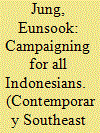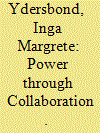|
|
|
Sort Order |
|
|
|
Items / Page
|
|
|
|
|
|
|
| Srl | Item |
| 1 |
ID:
110436


|
|
|
|
|
| Publication |
2011.
|
| Summary/Abstract |
This article addresses the issue of wind energy acceptance in the Canadian province of Quebec and, in particular, the impact of different models of wind power development on the degree of social acceptance. We show that the dominant advocacy coalition, which favors a hard path energy development in general, enforces a large-scale development of wind energy. Two other coalitions - a soft path coalition and a nationalist coalition - oppose this development, but not wind energy per se. We argue that difference in belief systems explains their opposition rather than planning issues or NIMBY concerns. We also contend that, despite its predominance over (wind) energy policy, the hard path coalition is willing to learn and make concessions towards the soft path coalition, but not towards the nationalist coalition.
|
|
|
|
|
|
|
|
|
|
|
|
|
|
|
|
| 2 |
ID:
149541


|
|
|
|
|
| Summary/Abstract |
Many scholars argue that democratization is conducive to the development of social welfare policies and that democracy brings about redistributive reform due to demands from the newly enfranchised poor. In reality, however, democratization does not necessarily bring about comprehensive social welfare reform. If not democratization, what explains social welfare expansion in developing countries? This article examines Indonesia, which began the process of democratization in 1998 following the fall of President soeharto, and which has since become a stable democracy with a consistently growing economy. More than a decade after soeharto’s resignation, Indonesia started to implement a comprehensive healthcare policy. What explains the gap between the enactment and the implementation of this social policy reform? In answering this question, I argue that electoral competition alone does not shape social policy reform. Instead, social reform has institutional prerequisites, such as the broad-based organization of its advocates. A broad-based organization goes beyond its narrow interests, builds cross-class alliance and pressures the government. Without this prerequisite, democratization does not necessarily result in comprehensive social reforms.
|
|
|
|
|
|
|
|
|
|
|
|
|
|
|
|
| 3 |
ID:
154792


|
|
|
|
|
| Summary/Abstract |
What light can foreign policy analysis (FPA) shed on how and when the balance of power between domestic coalitions in foreign nuclear policymaking changes and how these different balances directly affect policy outcomes? Drawing on interviews with scientists, technologists and career diplomats, this comprehensive examination of Argentine nuclear exports policy as public policy aims to depict when and how policies varied between 1976 and 2004, due to shifts in the balance amongst advocacy coalitions, albeit of incentives and constraints placed by international and institutional nuclear environments. The article provides a better account of how Argentine nuclear foreign policy changed under the influence of four competitive and contrasting advocacy coalitions: the pro-import substitution and protectionist coalition, the pro-technological autonomy and South-South trade coalition, the pro-business and commercial openness coalition and the antinuclear and pro-environment coalition.
|
|
|
|
|
|
|
|
|
|
|
|
|
|
|
|
| 4 |
ID:
160869


|
|
|
|
|
| Summary/Abstract |
Who gets what in high-level European Union (EU) negotiations and how? This study draws on data concerning stakeholder preferences during heated negotiations leading to the EU’s 2030 Climate and Energy Policy Framework. It tests the explanatory values of Liberal Intergovernmentalism (LI), the Advocacy Coalition Framework (ACF), and Historical Institutionalism (HI). Large member states were key (LI). However, coordinated groups of member states, bound by specific common interests, also played crucial roles. ACF explains the 2030 Framework only if: a) the decisive coalitions consisted of the EU’s supranational institutions, the coordinated groups of member states and long-term advocacy coalitions in the interest group community; b) coalition members held comparatively similar views; and c) coalition members adjusted their strategies mutually and/or shared information. The European Commission set the agenda (HI). The analysis demonstrates that LI, HI and ACF may be used as complementary analytical tools, filling several of each other’s gaps.
|
|
|
|
|
|
|
|
|
|
|
|
|
|
|
|
|
|
|
|
|